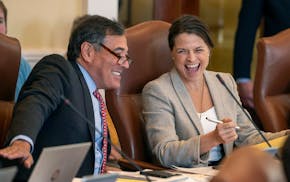All-day kindergarten should become a reality throughout Minnesota in fall 2014 under an education-funding bill signed by Gov. Mark Dayton on Wednesday. DFLers consider it one of their chief accomplishments of the legislative session.
"This is why we raised taxes progressively," Dayton said of the bill, which includes additional scholarships for early-childhood education, a boost in K-12 classroom funding and more money for special-education services.
This bill and another that funds colleges and universities consume about one-third of the $2.1 billion in revenues from tax increases that were approved during the session. DFLers believe such benefits as all-day kindergarten and a two-year tuition freeze at state colleges and universities are worth the effort it took to raise taxes on upper-income Minnesotans, smokers and businesses.
The DFL-controlled government had billed this as an "education session" and party members hailed Wednesday's bill-signing.
"This is a great day for our kids and the state of Minnesota," said Rep. Paul Marquart, DFL-Dilworth, bill sponsor and a social studies teacher at Dilworth-Glyndon-Felton High School in western Minnesota.
"It's not only a home run — it's a grand slam," said Sen. Chuck Wiger, DFL-Maplewood, the Senate sponsor.
The bill spends $134 million for all-day kindergarten beginning in September 2014; the funding will make it free to parents and school districts. The expansion would be optional for districts, but most are expected to implement it.
The bill also pumps $40 million into preschool scholarships based on need, adds $234 million to basic classroom education and adds $40 million to special eduction.
It also ends high-stakes tests called the GRAD tests and replaces them with measurements aimed at more quickly identifying problems and better preparing students for college. It raises the age for compulsory attendance from 16 to 17, making it somewhat more difficult to drop out of high school.
Overall, the education-funding bill accounts for the largest single piece of the state's general fund budget, $15.7 billion of state assistance to public schools over two years. While DFL leaders clearly believe that it will be popular, Republican opponents see the bill as an empty promise.
"It's full of money and empty of reform," said Rep. Kelby Woodard, R-Belle Plaine, assistant minority leader and a GOP leader on education finance. He said the bill is "full of pixie dust" such as the goal of eliminating the achievement gap and high school dropouts by 2027.
Woodard and other Republicans say it would have made more sense to give additional money to the districts and let them decide what to spend it on, rather than tie it to all-day kindergarten. "They tout all-day kindergarten as being the silver bullet," he said, but it has not proven to eliminate the achievement gap in other states.
Rep. Ryan Winkler of Golden Valley, a DFL advocate for early childhood education, criticized the bill as not going far enough. He said a $5,000 limit on preschool scholarships will pay for less than half a year of high-quality education for these families.
Jim Ragsdale • 651-925-5042
The Latest | Seated juror in hush money trial excused as prosecutors ask judge to sanction Trump
Former Wisconsin Democratic Rep. Peter Barca announces new bid for Congress

